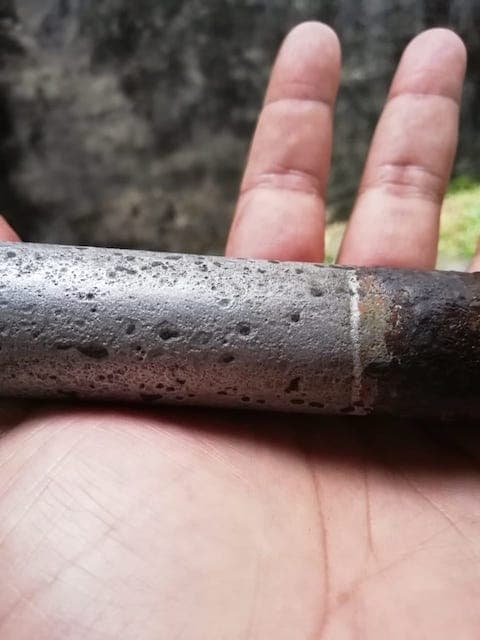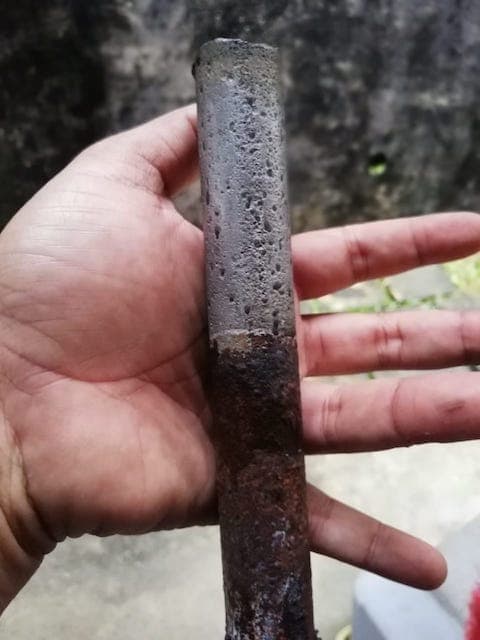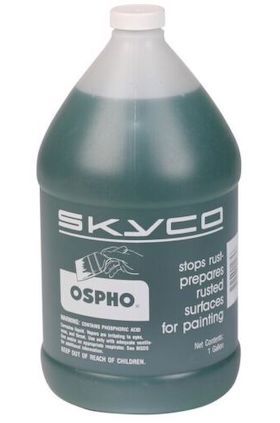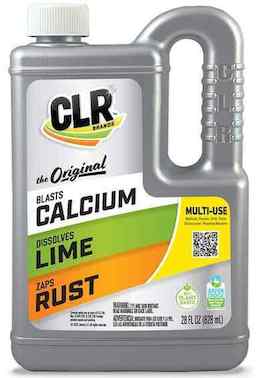
-----
Remove rust with muriatic acid (HCl / hydrochloric acid)
Quickstart:
Muriatic/hydrochloric acid is a powerful rust remover used in steel mills, plating shops, and other factories because, although it dissolves metal, it dissolves rust much quicker than the metal.
But for most consumer situations, there are other acids which are safer, and offer other advantages. This acid, unlike most others, is actually a gas dissolved in water, so there is a very great tendency for it to fume in champagne or ginger ale manner and for those acid fumes to attack & corrode other things. You don't need to splash for things to be damaged, the invisible fumes can corrode metal.
Q. Hi Trevor,
I am handy man trying to unblock a stainless steel sandwich plate oil cooler (engine oil to engine coolant heat exchanger) on a Nissan Patrol. Will HCl
⇦ on
Amazon [affil link]
be ok to remove iron oxide blockage, it seems to be reacting and may take a few days of filling and draining ... but will it harm the stainless steel.
- Waikerie south Australia
October 21, 2023
A. Hi Allen,
We'll try to advise Trevor of your question, but his posting was from many years ago.
HCl is very bad for stainless steel; the chloride ions are very corrosive to stainless steel, cause pitting, and are very difficult to eliminate. Please don't continue to use it.
Nitric acid is not safe on steel (at all!) -- don't even think about it.
Phosphoric acid
⇦ on
eBay
or
Amazon [affil link] is safe for both; unfortunately, I don't know if it will actually unblock that heat exchanger. Hopefully another reader will have a good suggestion.
Luck & Regards,

Ted Mooney, P.E. RET
Striving to live Aloha
finishing.com - Pine Beach, New Jersey
Ted is available for instant help
or longer-term assistance.
⇩ Related postings, oldest first ⇩
Q. I have been trying to remove rust from various vehicle parts using ±36% HCl diluted 7 parts water to 1 part HCl. However the process is extremely slow (little to no visible change after 4-5 hours). I suspect the ambient temperature is possible slowing the process down, (14 °C) or perhaps the concentration is incorrect. Any advise would be greatly appreciated.
James [last name deleted for privacy by Editor]- Cork, Ireland
2004
A. Hi James. It's not too cold, it's too dilute. 10 to 20 percent by weight would be better. Dilute it 2 or 3:1 rather than 7:1.

Ted Mooney, P.E.
Striving to live Aloha
finishing.com - Pine Beach, New Jersey
Ted is available for instant help
or longer-term assistance.
A. Personally I would not use hydrochloric acid because chloride ions readily promote rusting of iron and steels. To ensure you have removed all the acid will require extensive post treatment processing. I would recommend either sulfuric or possibly sulfamic acid
⇦ on
eBay
or
Amazon [affil link] , depending on how much rust is present. You can then treat the steel with either strong nitric acid or phosphoric acid to give it a passive layer.

Trevor Crichton
R&D practical scientist
Chesham, Bucks, UK
Q. Thanks for the advise, Ted. I have tried your suggestion but am still disappointed with the results. After 3 hours even light rust has not been removed. However rubbing with a wire brush at this stage does remove some of the rust. I had hoped to be able to remove all rust in 2-3 hours, is there possibly a better acid for the job?
James [returning]- Ireland
A. Although HCl is widely used for pickling and as prep for plating, Trevor Crichton is correct that it is corrosive and may not be ideal for older parts or complex pieces. I don't think a hobbyist should use the nitric acid post treatment, but the phosphoric acid sounds good. Alkaline electrolytic de-rusting is yet another possibility.
But what I completely fail to understand is strong HCl not dissolving rust; the reaction should be nearly instantaneous -- a few minutes at the absolute most, not a few hours. Are you sure the parts were free of oil, grease, lacquer and dirt? -- proper cleaning must precede acid treatments.

Ted Mooney, P.E.
Striving to live Aloha
finishing.com - Pine Beach, New Jersey
Ted is available for instant help
or longer-term assistance.
|
|
A. For hobbyist citric acid
⇦ on
eBay
or
Amazon [affil link] based solution is safest. You can use 5 % ammonium citrate solution (pH 3,5), temp. up to 80 °C! - Zagreb , Croatia Q. Thanks for the replies, guys. I have been using phosphoric acid and although the results are quite good the process is painfully slow ... hence my usage of HCl. Can I post-treat HCl dipped parts in phosphoric acid? James [returning]- Ireland |
A. Dear James,
You can use sulfuric acid 10 percent at about 65 to 88 °C, time 5 to 10 min. With good exhaust system sulfuric acid gives off no noxious fumes.
Thanks,
Aly Gomaa- Egypt
⇦ Tip: Readers want to learn from your situation;
so some readers skip abstract questions.
Q. Good morning, I used HCl as metal rust removal liquid, but excess fumes come out from acid. How to reduce fumes? Otherwise any other alternative clean liquid for metal rust?
A.LEO MICHAEL DURAIRAJ- hosur, tamilnadu, India
February 12, 2018
A. Hi A.LEO,
It's not clear if you are an industrialist regularly processing parts in acid treatment vats, or a hobbyist doing a one-off treatment in a plastic bucket.
• If you are a hobbyist, you could wire brush the parts, and then treat with phosphoric acid, or use the HCl outdoors.
• If you are an industrialist you should be using inhibited HCl, not commodity HCl, and your tanks should be equipped with exhaust ventilation systems. Good luck.
Regards,

Ted Mooney, P.E. RET
Striving to live Aloha
finishing.com - Pine Beach, New Jersey
Ted is available for instant help
or longer-term assistance.
⇦ Tip: Readers want to learn from your situation;
so some readers skip abstract questions.
Q. Hi, I want to remove rust from newly made window grills and gate. It's made of pipes; please advise what I should do. Grill size is 6 feet x 8 feet and gate is 14 feet x 6 feet
Ahsan Rasheed- Islamabad, Pakistan
May 21, 2018
A. Hi Ahsan. If these are plain steel pipes, they are not rust resistant and must be painted. You can remove heavy rust with a wire brush, then apply phosphoric acid based rust converter
⇦ on
eBay
or
Amazon [affil link]
, then you must paint these items. Good luck.
Regards,

Ted Mooney, P.E. RET
Striving to live Aloha
finishing.com - Pine Beach, New Jersey
Ted is available for instant help
or longer-term assistance.
Q. Hi, please advise for rust removal should I use HCl in concentrated form or in diluted form. If diluted what will be the ratio of HCl and water?
Ahsan Rasheed [returning]- Islamabad, Pakistan
May 23, 2018
A. Hi cousin Ahsan. I suggest 10 to 20 percent by weight, which means if you had pure HCl you would add 1 part of HCl to 4 parts of water to get 20%. But if the concentration of your acid is ±36%
⇦ on
Amazon [affil link]
, like James had and is commonly available, 1 part acid to 1 part water would give you 18% acid, which would probably be fine.
But please tell us who you are and what your situation is because your question remains abstract. We don't know if you are a homeowner trying to dangerously de-rust your own grills & gates with a sponge, using HCl although we've told you it isn't appropriate, or whether you are a plant manager running a high production pickling line for grills. No one can talk about safety, environmental issues, hydrogen embrittlement, ongoing corrosion from chloride ions, inhibitors, the Kleingarn curve, and many other "ifs, ands & buts" of the subject when we don't know who you are and what your situation is. Sorry, and good luck, or please try to understand what we need from you. A grill made of welded pipes is unlikely to be hermetically sealed; if you dip it in acid, it's likely to become full of acid which you'll never be able to remove.
Regards,

Ted Mooney, P.E. RET
Striving to live Aloha
finishing.com - Pine Beach, New Jersey
Ted is available for instant help
or longer-term assistance.
Q. Hi Everyone.
I have 310 fairly heavy rusted 11 foot pipes for cleaning.
I would say I am a little advanced over average as I have been doing DIY projects for some time.
I got HCl 31-33% for the job, but new to HCl.
My question is,
01. Looking at plastic rain gutters for the bath. Will it hold the HCl?
02. If I don't dilute it, the process will be faster. Any cons?
I intend to paint the pipes after the acid treatment.
Here is a pic of a sample pipe which was treated using acetic acid
⇦ on
eBay
or
Amazon [affil link] , but the process is a little too slow for me.


Thank you.
Shehan Daulagala- Sri Lanka
August 2, 2018
A. Hi. I hope these pipes will be used strictly for a decorative application because they look like they have no integrity with such extensive pitting. Pure PVC is very acid resistant, so are polyethylene and polypropylene, but other plastics like nylon are not. So put a little piece of the rain gutter into the acid bottle for a week or two and see what you learn about its resistance; are you sure you can plug it water-tight?
You'll probably want to plug the pipes before immersing them. I think you'll have to re-fill the gutter with fresh acid at least a dozen or more times to do 310 pipes, with countless opportunities for safety accidents or pollution incidents doing them one at a time in a rain gutter -- but good luck. A plating shop with 12 foot wide tanks could probably do this in an hour or so, but it will take you a week, maybe more :-)
Regards,

Ted Mooney, P.E. RET
Striving to live Aloha
finishing.com - Pine Beach, New Jersey
Ted is available for instant help
or longer-term assistance.
![]() Hi Ted, Thank you for your response. Yes they are decorative, the pits are what attracts them to me, the very rustic look ;)
Hi Ted, Thank you for your response. Yes they are decorative, the pits are what attracts them to me, the very rustic look ;)
The plating shop was a good idea, will look for one.
The HCl comes in high molecular weight polyethylene(HDPE) containers, and gutters are made of Polyvinyl chloride (PVC) or uPVC, PVC is much more stronger than HDPE. But like you recommended I will just submerge a piece of gutter to HCl and see.
The danger and accident ratio using gutters are true :(
Thank you
- Colombo, Sri Lanka
How to neutralize hydrochloric acid in an engine
Q. Hi guys. I have a classic car engine, and after 15 years sitting in a garage I decided to restore it. I have done the normal process, opened it, cleaned everything, etc., but when I assembled it the coolant didn't circulate. After I opened it about three times I decided to fill it up with hydrochloric acid and left it for a night. In the morning I rinsed it out many times until the water came out clean. I assembled everything and the coolant circulated properly, the problem is that every about 3 months the coolant is coming rusty every time -- I think the acid is still alive! Can I dissolve baking soda with water and leave it for a while so it neutralizes the hydrochloric acid please? I appreciate if someone can help please, thanks regards, Chris
Christian GialanzeHobbyist - Zurrieq, Malta
June 4, 2019
A. Hi Christian. Yes, I think you can do that under your conditions, although I would hate for other readers to misread things and extrapolate (because the reaction of baking soda with HCl creates huge amounts of CO2 gas). Use only a pinch or two of baking soda [in bulk on eBay or Amazon [affil link] , because there surely can't be much acidity left after all that rinsing.
Regards,

Ted Mooney, P.E. RET
Striving to live Aloha
finishing.com - Pine Beach, New Jersey
Ted is available for instant help
or longer-term assistance.
![]() Thanks very much for your immediate reply Ted, I'm going to try it and will see if the problem is solved; thanks again Ted.
Thanks very much for your immediate reply Ted, I'm going to try it and will see if the problem is solved; thanks again Ted.
Kindly regards,
- Zurrieq malta
A. After your baking soda treatment, fill it with any modern anti-freeze and future rust will be prevented.

Jeffrey Holmes, CEF
Spartanburg, South Carolina
A. Let me emphasize Jeffrey's use of the word "modern". I have read in several places now that people often mistakenly believe that ethylene glycol is a corrosion-inhibitor -- but it isn't! Modern antifreeze works as a corrosion inhibitor because it contains corrosion inhibitors, not because it contains ethylene glycol :-)
Luck & Regards,

Ted Mooney, P.E. RET
Striving to live Aloha
finishing.com - Pine Beach, New Jersey
Ted is available for instant help
or longer-term assistance.
Q. G'day crew, my name's Mark from Australia ... I'm artistic in about 5 different mediums and at present, I'm working with knives -- making handles, sheaths, shoulder holsters ... unique unusual. And being a knife lover, I recently acquired two Raindrop Damascus steel knives but they had a little bit of rust starting on them which now is getting outta hand... I was told to use sulfuric acid, I think 70/30 mix but it was too casually said for me and thought I'd try my luck on line ... I've read through the earlier Q and A's and thought the answers came from a knowledgeable place, so if anyone has any ideas, I'd been keen to try them ... thanks for your time.
Mark Erlandsen- Ashmore, Gold Coast, Queensland, Australia
February 20, 2020
A. Hello Mark,
Have you tried CLR? It would be much safer for you than HCl.
Retired - Winston Salem, North Carolina, USA
Q. Hey Mark Baker, CLR ???
I have got some around here somewhere. Have you had Damascus steel with rust and tried this yourself mate ?
I've been doing a heap of reading and YouTube watching and tried WD-40, bicarbonate, lemon, etc ... they've taken the loose stuff off, no problems ... but the knife still has the discolouring or scars, and ultimately what I'm looking for is the stark difference of steel and carbon, the black and silver of a clean blade to use as props or include in art pieces. It was mentioned the best way to achieve what I'm looking for was with some sort of acid wash ... lol, but I haven't tried the CLR yet so I'll give it a go. Much appreciated for your input.
- Gold Coast Queensland
A. You should look at ultrasonic cleaning; it can work here.
vedant aggarwal- delhi, India
⇦ Tip: Readers want to learn from your situation;
so some readers skip abstract questions.
Q. If dipping metal in muriatic acid. What can I use to stop it from pitting the metal? Best rinsing agent?
Ger ross- Milwaukee Wisconsin
February 16, 2021
A. Try ammonium citrate solution ( 5 %, pH 3,5) - better, safer and more environment friendly solution.
Hope it helps and good luck!
- Zagreb Croatia
Q. Hi everyone,
Currently I'm working on a shipbuilding project in Malaysia. I found some of the pipe materials (carbon steel) heavily rusted because not preserved properly. The client asking us to clean the pipes using Hydrochloric acid to evaluate. I got HCl 31-33% for the job, but new to HCl. What is the right concentration of HCl to be used for cleaning of these pipes? For information, these pipes to be installed on the ships after cleaning.
Quality Inspector - Perak, Malaysia
November 23, 2022
A. Hi Thanes. If you were involved in major ongoing de-rusting of pipes where economics was a driving factor, the answer would not be easy, because there is actually a fairly well developed science just on this subject -- see Barlow Campano's article "The Kleingarn Regenerated Spent Acid" in our on-line library as a starting point, or use the search term 'Kleingarn Curve' with a search engine.
But for a "one off" project like this I'd probably just fill the tank halfway with water, then slowly fill the remaining half with acid because a little over 15% ought to work fine.
There are a couple of other things to consider here, though. Your acid really ought to have an 'inhibitor' in it so the acid is consumed only (or mostly) in dissolving rust, not in attacking the steel. Also, in case you don't know, the pipes will rust again very quickly if you just acid dip them and rinse them. You must neutralize the acid with a dip in some sort of alkali, and then dip in some sort of rust preservative.
Luck & Regards,

Ted Mooney, P.E. RET
Striving to live Aloha
finishing.com - Pine Beach, New Jersey
Ted is available for instant help
or longer-term assistance.
Q, A, or Comment on THIS thread -or- Start a NEW Thread

